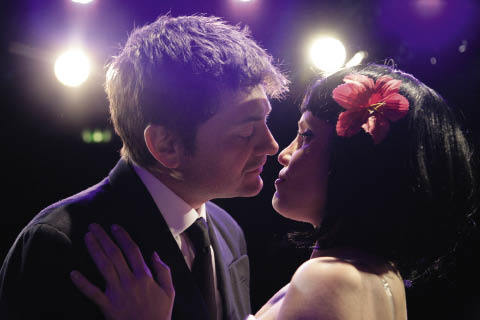It’s sometimes intriguing to speculate, as you go to an opera in a fringe production of one kind or another, about how much messing around (used neutrally) this or that popular work can take.
It’s sometimes intriguing to speculate, as you go to an opera in a fringe production of one kind or another, about how much messing around (used neutrally) this or that popular work can take. OperaUpClose scored an enormous success with its version of La Bohème in 2009/10 (though its claim to be the longest-ever run of an opera should be balanced by the fact that The Cock Kilburn could seat only about 40 people). At the larger venue of the King’s Head, it went on to, in my view, a notably less successful The Barber of Seville (or Salisbury), a work which needs much more precise performance, as well as being a comedy, always treacherous for semi-professionals.
My hopes weren’t all that high for Madam Butterfly (or Bangkok Butterfly) for several reasons. One is the sheer demands of the title role, one of the longest and most taxing in opera. At a Juilliard Masterclass in 1972 Callas, who sang only three performances on stage, described it as ‘treacherous’ to an aspiring Butterfly, and warned about how strong a singer you need to be to tackle it. Going with that is the extremely helpful orchestral accompaniment Puccini provided for his heroine, whereas OperaUpClose can only run to a piano, violin and clarinet, though the arrangement is a very skilful one; but the three instruments can’t provide any cover, or a lot in the way of support.
Then there is the decision to update the action and extensively rewrite the libretto, a task undertaken by the company’s two founders, Adam Spreadbury-Maher and Ben Cooper. They have aimed at the controversial, making Butterfly and her/his companions ladyboys of Bangkok. Opera has long been familiar with gender-bending, but this is the first Western opera, I believe, in which female performers sing and act as males or t/ss. Not that I would have realised, if Sharpless hadn’t informed Pinkerton, who takes the information very much in his stride.
Trans-gendering Butterfly does of course give rise to a huge problem: what to do about Sorrow, the boy Butterfly bears Pinkerton as a result of their night of love? In this version Sorrow becomes the child of Butterfly’s sister, who has died of Aids; and the child himself is ‘sick’. Alas, we see no child, but only a wizened puppet, brought on and sustained by minders. This terrible and alienating idea is borrowed from ENO, the deplorable production of Anthony Minghella which has kept me away from the opera for several years. Surely it would have been easy to get a child to take the role? As it is, the sight of this gruesome manikin excited giggles, and one of Puccini’s most effective (and legitimate) heart-tuggings is nullified.
The librettists need, too, to look at successful libretti and see what pitfalls they don’t disappear into. In this Butterfly not only are too many words unintelligible because sung too loud, but the words and the sentence constructions are often so unwieldy that only reading the text afterwards (it is thoughtfully included in the programme) enabled me to see that a word that puzzled me was ‘inconsequenceless’ — not a word I’d come across before, and meaningless as well as impossible to sing. The text, all told, reads too well to be sung intelligibly.
Despite all of which, the evening was a powerful one, though how much more powerful it would be if its pretensions and ‘improvements’ were abandoned. Nor can I see that anything OperaUpClose has done to Puccini’s masterpiece has rendered it in any way more accessible, made it more likely that decent non-opera-going folk will be converted, etc. The supreme opera composers had — this is tautological — something approaching theatrical infallibility. Perhaps that is above all true, indeed is often used as a ground of reproach, of Puccini.
Still, the Butterfly I saw, Mariya Krywaniuk, though no more plausible as a 15-year-old than any other I have seen, has a great deal going for her. She is beautiful and sexy, passionate and in some ways childlike, and often sings with lovely though incisive tone. Under pressure her voice hardens, but she is a true operatic personality — and Butterfly hardly needs any other.
The Pinkerton of Mario Sofroniou (is it me, or are opera singers’ names getting harder to remember and spell?) is a mature lecher, with — in this context — a large, unwieldy voice. The Suzuki of Adriana Festeu is ideal, a model of restraint and concern. Andrew McIntosh is an unusually complicit Sharpless, who shouldn’t have to sing ‘Pinkerton is an asshole’, another line which provoked mirth. The Ladyboys made me jump out of my skin on their entry, which should be a distant accompaniment for Butterfly’s glorious floated opening notes. And one more grouse: there are variations of tempo in Butterfly, but this one began molto moderato and never seemed to change.
As so often, I wondered how non-opera goers liked it. If you are an opera-goer, I’d certainly recommend that you give it a try.





Comments